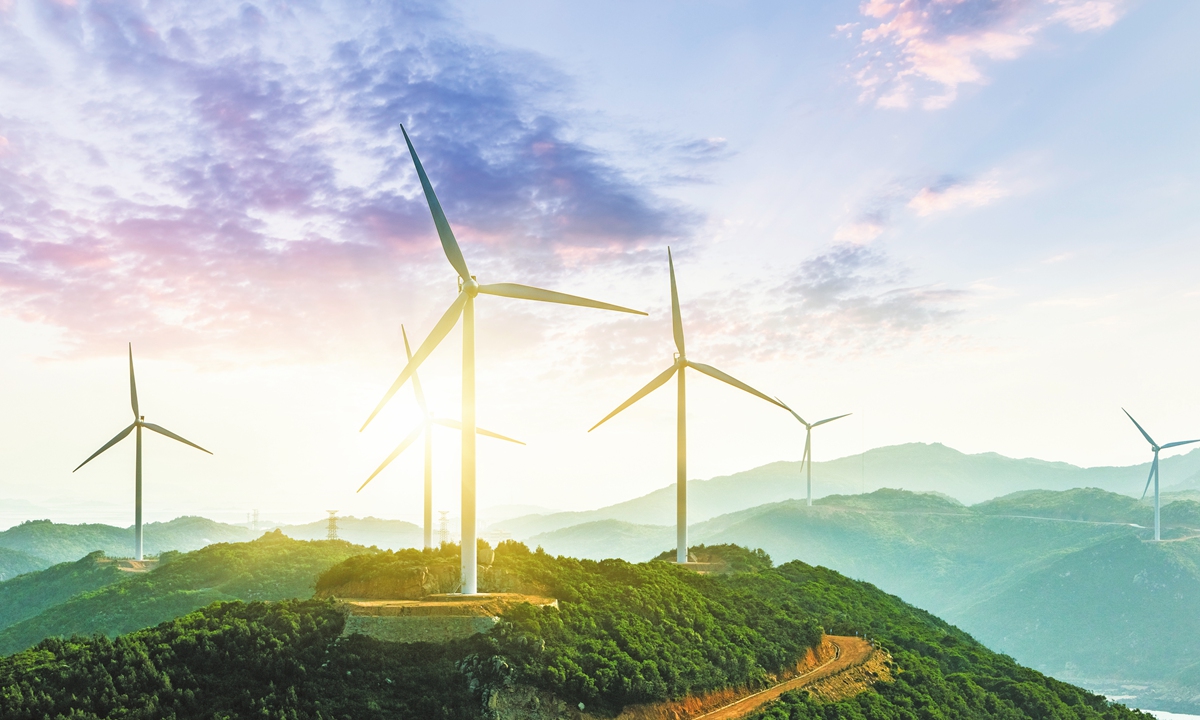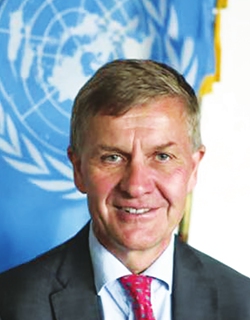West needs to get up early to compete with China in environmental technologies: former UN undersecretary-general

Photo: VCG
Editor's Note:During the past decade, the world has increasingly witnessed a trend of "the East is rising, and the West is declining" in the spheres of economy, security and discourse power. Western countries, particularly the US, plagued by internal woes, have sought the old path of passing the buck and instigating turmoil elsewhere to ease their own pressure. China, representative of the emerging countries, is proposing new solutions to global problems. By advocating win-win development, facilitating consultation and reconciliation and proposing a balanced and effective security mechanism, China is striving to build a community with a shared future for mankind.
In the ninth piece of the series, Erik Solheim (Solheim), former undersecretary-general of the United Nations and former executive director of the UN Environment Programme, told Global Times (GT) reporter Li Aixin that the progress on air pollution in China, compared internationally, is incredible. He stressed no one should blame China for the climate crisis and Westerners should be a little bit less arrogant.

Photo: unep.org
GT: About a decade ago, pollution was bad in China. US Embassy in Beijing even released unofficial hourly PM2.5 readings. Now blue skies are back. Reports show the concentration of PM2.5 decreased 63 percent in Beijing over the past years. How do you think China has achieved it?
Solheim: The progress on air pollution in China, compared internationally, is absolutely incredible. China has reduced air pollution in seven years as much as we have done in Europe and North America in 30 years. This is absolutely remarkable and positive.
I believe it happened because this was a major demand of the Chinese people. The message was accepted by the country's political leadership. They decided to act and they acted very determinedly. That's why we're seeing pollution coming down that fast.
It's not just air pollution by the way, but also water pollution too. In places such as Zhejiang Province, south of Shanghai, there have been fantastic progresses on river pollution. There used to be rivers once called milky rivers because they were white from pollution. Now they are so clean. You can send a two-year-old into the river for a bath with no problem.
The incredible progress on water management in Zhejiang is so visible. Very beautiful housing projects come up, with temples, tourists, and the beauty of the nature, turning around which was so polluted into so positive. That made a very strong impression on me.
If you look at Inner Mongolia, China is first class in fighting desertification, greening of the land.
There are also so many new national parks. I visited one national park in Sichuan Province where they use high tech to improve the protection of pandas. China is moving very fast on pollution control, and also on protection of nature.
There are now fishing bans on the upper reaches of the Yellow River and the upper Yangtze River. This will be short-term pain for people around these rivers. But in the long run, their ecosystems will restore and fish will return in abundance. Everyone will see the wisdom of doing this.
GT: There has been a buzzword coined by Chinese leadership called "ecological civilization." What are your understanding and views on "ecological civilization?"
Solheim: It's a great concept. It is a new way of thinking about the environment.
The old way was to avoid the negatives. Environment was about protection against the negatives. American president Richard Nixon established the Environmental Protection Agency in the US, to stop pollution and stop the negatives. Ecological civilization, however, is about the positive, enormous progress for humans where they can live in a society which is much more environmentally friendly.
It's integrating the human aspect, the natural aspects, and technological aspects into one - creating an ecological civilization, which could unify humanity in the 21st century.
GT: Quite recently, you tweeted about China's offshore wind capacity and hydropower. Among renewable energy sources, what are the unique values of hydropower and offshore wind capacity? And are there any other fields in environmental protection, in which China is also taking the lead?
Solheim: We need to move very fast on all renewable resources, solar, hydropower, all of them. And China is now the leading nation in every single green technology. 80 percent of all solar panels were made in the very last year (in China), 60 percent all solar power on the grid, 80 percent of hydro, 80 percent of wind, and 70 percent of all electric batteries, just to give a few numbers.
So frankly, we, in the West, need to get up early in the morning and compete with China in these technological areas. That will be good for humanity because competition will drive a far faster and more positive change.
China is in the lead. Hydro is essential because it is a good environmentally friendly technology by itself. It can also function as a battery. The sun is not shining all the time, the wind is not blowing all the time, but you can turn on and off hydropower at a very rapid speed. So, it can function as a battery for other technologies.
I think it's well known to many that China is leading on environment technologies. But China is also in the lead on innovative practices for the environment, like desert control, green cities, and creating a huge number of national parks and protected areas. China has pledged to plant and conserve 70 billion trees by 2030. That's an amazing promise. I'm sure China will also deliver upon this promise.
GT: In international public opinion, China's effort in environmental protection is somehow twisted or criticized for political reasons. For example, Western media outlets are generally reluctant to touch upon per capita greenhouse gas emissions. Some even say that China's love for meat is threatening the environment. What's your take on these voices?
Solheim: Frankly, Westerners should be a little bit less arrogant. US emissions per capita, from the beginning of carbon emissions up to today, are about 8 times Chinese emissions per capita, and is, by the way, 25 times that of Indian emissions per capita. In Glasgow, some even blamed India for the carbon crisis.
No one should blame China or India for the climate crisis. The crisis is mainly caused by the West. But emissions are also coming up fast in China. China is not acting on climate because of the West. China is doing this for its own sake.
We are all in this together. We should stop blaming each other, and find all the areas where we can work together. Because fighting climate change is in the interest of the people of China, the US, and all European nations. It is in the common interest of humanity.
GT: How do you view the US' previous departure from the Paris Climate Agreement? What impact will politicization of global environmental protection have?
Solheim: Interestingly, when the US made this mistake of withdrawing from the Paris Climate Agreement, it had a limited impact on American emissions, for a simple reason that American businesses want to move ahead reducing emissions. They have invested in a lot of renewables, much less than that of China, but are still moving in the right direction.
But to make politics out of this is very bad. We should use political means to control climate emissions but we should avoid any sort of political conflicts. It seems now to be an opportunity in the US. If President Biden will get the climate package through Congress, that would be a very positive development. But on that basis, the US should be encouraged to work very closely with China to curb emissions. We should see climate and environment as one common platform for avoiding conflicts in other areas.
GT: According to reports, Germany is planning to revise a key climate target to reach greenhouse gas emissions neutrality in the country's energy industry by 2035. The US Supreme Court limits federal power to curb carbon emissions. Against the backdrop of an energy crisis, where is the trend headed?
Solheim: In the short term, there may be problems coming for renewable energy from the war in Ukraine, because people will employ a little bit more coal, oil, and gas in the short term. In the long term, I think the result is to supercharge a renewable revolution.
In Europe we want to be less dependent on Russian oil and gas. What can Europe do? Well, the sun is European, there is European wind and European water resources. All those resources are domestic, and it will make Europe a lot more independent.
Even nations like China, India, Brazil and South Africa, which do not support a boycott on Russia, they do not want to be dependent on a volatile and vulnerable oil market. In these nations, renewables are more affordable domestic resources, compared to oil and gas. Again, it makes so much sense to focus on solar, wind and hydro. I think we will see a supercharging of a renewable revolution.
GT: Japanese regulators recently approved the release of Fukushima's nuclear-contaminated water into the sea. In this regard, do you think Western countries have shown some double standards? What commitment needs to be made to the international community before the dumping of the water?
Solheim: I think the most important demand, if a nation does something like this, is to consult very closely with all those neighbors or nations who may be affected by the release.
In the case of Japan, consultations with China, South Korea and other neighbors may be critical. I do not know how powerful this release is. I visited Fukushima a year after the accident. There were no deaths immediately from the nuclear accident. But 20,000 Japanese died from the tsunami, which was caused by the earthquake in the sea outside Japan.
In a way, the accident also illustrated the primacy of climate protection, because the vast majority of the Japanese died from the natural catastrophe not from any nuclear spills.
But I will encourage Japan and every other nation that if they want to do something like this, please consult your neighbors.



